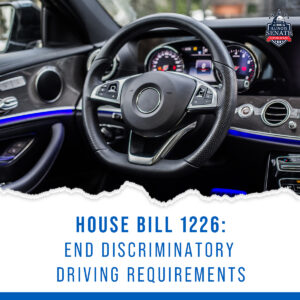Senate Republicans Urge Governor Pritzker to Protect Vulnerable Illinoisans

SPRINGFIELD – The Illinois Senate Republican Caucus is calling on Governor JB Pritzker to protect critical funding that provides care for adults with intellectual and developmental disabilities (IDD) in Illinois.
State Senator Dave Syverson (R-Cherry Valley) says Republican Senators sent a letter to the Governor, urging him to fully restore a proposed $32 million cut to Direct Support Professional (DSP) service hours in Community Integrated Living Arrangements (CILAs), where nearly 10,000 Illinois residents, including many in Northern Illinois, receive care.
“When it comes to budget considerations, taking care of the most vulnerable in our population clearly needs to be a priority,” Senator Syverson said. “The idea of providing free healthcare and benefits to non-citizens while cutting benefits to our developmentally disabled population is something I oppose and believe most Illinoisians would stand against.”
The Governor’s proposed budget includes a 50-cent wage increase for front-line workers, but at the same time proposes reducing the hours to serve these clients. The end result of the Democratic proposed budget is the elimination of an estimated 430 positions and a net loss of $32 million to local community providers.
Senate Republicans say the proposed rollback threatens the state’s progress toward meeting federal requirements under the Ligas Decree and increases the risk of institutionalization for individuals with disabilities — a path many families have worked for decades to avoid.
The Senate Republican Caucus is urging the Governor to restore the full $32 million in service hours and recommit to building a fair, inclusive, and compassionate system of care for individuals with disabilities and their families.
Senate Republicans Unveil Plan to Combat Rising Energy Bills

With energy prices once again on the rise, Senate Republicans are calling for immediate action to protect Illinois families from even higher electricity costs in the future.
According to recent utility filings, Ameren customers are expected to see their average monthly summer bills rise from $37.62 to $45.98, while ComEd customers could pay up to $118.60 per month, up from $108. These increases are tied to the results of recent energy grid capacity auctions.
With families already stretched thin by rising costs for groceries, gas, and housing, Senate Republicans say it’s time for Illinois Democrats to get serious about energy reform.
To address the problem, Senate Republicans are pushing a three-part legislative package aimed at improving energy reliability and affordability across the state:
- Senate Bill 1234: Creates the Illinois Regional Generation Reliability Task Force, which would examine how state policies, including the Climate and Equitable Jobs Act (CEJA), are impacting energy prices and reliability.
- Senate Bill 1235: Repeals the forced 2045 closure date for coal and natural gas plants under CEJA and allows for the construction of new gas peaker plants to meet energy demand without fear of premature shutdowns.
- Senate Bill 1236: Cuts red tape at the Illinois EPA to fast-track permits for new power plants. One key example is the Lincoln Land Energy Center in Pawnee, which began the permitting process in 2017 and is now not expected to open until 2028 due to delays.
Senator Syverson says the plan will help prevent future rate hikes and ensure grid reliability by expanding access to dependable, affordable energy. He adds that continued inaction by Democratic lawmakers and their refusal to acknowledge the clear link between these rate hikes and the policies they’ve supported is simply unacceptable.
In the meantime, Illinois residents are encouraged to visit the Senate Republican Caucus’ FAQ page to learn how they can reduce energy usage and soften the impact of expected summer rate hikes.
Governor Pritzker’s Budget Crisis Sparks Last-Minute Tax Hike Talks

With just one week left until the General Assembly is scheduled to adjourn, Illinois Democrats are scrambling to fix a budget shortfall caused by years of unchecked spending.
Since Governor Pritzker took office, the state budget will have grown by nearly 40 percent, and now, with a major deficit looming, Democrats are reviewing a menu of more than $6 billion in possible new tax hikes.
Proposals reportedly include new taxes on digital advertising, capital gains, corporate income, and an increase in the estate tax/death tax. Meanwhile, Illinois families are already struggling with the nation’s highest overall tax burden.
Instead of cutting waste or making responsible choices, Democrats continue to prioritize expensive spending, including free healthcare for undocumented immigrants, and expect taxpayers to foot the bill.
Senate Republicans are standing firm, calling for fiscal responsibility and opposing efforts to make life even harder for working families and small businesses.
Legislation to End Discriminatory Driving Requirements Against Seniors Passes

Senator Syverson has long advocated for legislation to end discriminatory driving test requirements for older Illinois drivers. On May 22, such a measure, which he is cosponsoring, was passed by the Senate and is now on its way to the Governor’s desk for his signature.
House Bill 1226 will eliminate the automatic behind-the-wheel driving test rule for drivers aged 79-87 in Illinois. Currently, drivers aged 79 and 80 must take a driving test whenever their four-year license is due for renewal. For drivers aged 81-86, they must retake the driving test every two years, and after the age of 87, driving tests are required annually.
The new measure would bring Illinois’ driving laws in line with senior driving regulations in other states. It includes the following provisions:
- Drivers aged 79 and 80 would still be required to visit a DMV facility if they need to renew their driver’s license and take a vision test (and a written test if they have a driving violation on their record) but would not have to take a behind-the-wheel test.
- Drivers between the ages of 81-86 would still be required to visit a DMV facility to renew their license every two years and would have to take a vision test (and a written test if they have a driving violation on their record) but would not have to take a behind-the-wheel test.
- Rules for drivers aged 87 and older would remain the same, with a behind-the-wheel driving test and vision test required annually.

